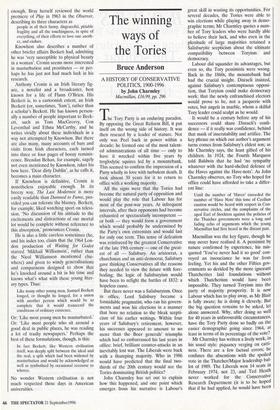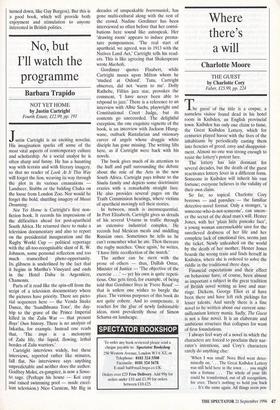The winning ways of the Tories Bruce Anderson
A HISTORY OF CONSERVATIVE POLITICS, 1900-1996 by John Charmley Macmillan, £16.99, pp. 296
The Tory Party is an enduring paradox. By opposing the Great Reform Bill, it put itself on the wrong side of history. It was then rescued by a leader of stature. Not only was Peel back in power within a decade; he formed one of the most talent- ed administrations of all time — only to have it wrecked within five years by troglodytic squires led by a mountebank. This seemed to confirm the impression of a Party wholly in love with turbulent death. It took almost 30 years for it to return to office with a working majority.
All the signs were that the Tories had become the natural party of opposition and would play the role that Labour has for most of the post-war years. At infrequent intervals, after their opponents had become exhausted or spectacularly incompetent or both — they would form a government which would probably be undermined by the Party's own extremists and would last for only one term. This sense of defeatism was reinforced by the greatest Conservative of the late 19th century — one of the great- est of all — Salisbury. An aristocrat, a churchman and an anti-democrat, Salisbury gave thinking Conservatives all the reasons they needed to view the future with fore- boding; the logic of Salisburyism would have been to refight the battles of 1832: a hopeless cause.
But there never was a Salisburyism. Once in office, Lord Salisbury became a formidable pragmatist, who ran his govern- ments and won his elections in a manner that bore no relation to the bleak scepti- cism of his earlier writings. Within four years of Salisbury's retirement, however, his successes appeared to amount to no more than the Boer generals' triumphs which had so embarrassed his last years in office: brief, brilliant counter-attacks in an inevitably lost war. The Liberals were back with a thumping majority. Who in 1906 would have predicted that the final two- thirds of the 20th century would see the Tories dominating British politics?
John Charmley has set out to explain how this happened, and one point which emerges from his narrative is Labour's great skill in wasting its opportunities. For several decades, the Tories were able to win elections while playing away in demo- graphic terms; Mr Charmley quotes a num- ber of Tory leaders who were hardly able to believe their luck, and who even in the plenitude of large majorities retained a Salisburyite scepticism about the ultimate compatibility between Toryism and democracy.
Labour did squander its advantages, but even so, the Tory pessimists were wrong. Back in the 1860s, the mountebank had had the crucial insight. Disraeli insisted, against Salisbury's contemptuous opposi- tion, that Toryism could make democracy work: that the newly enfranchised electors would prove to be, not a jacquerie with votes, but angels in marble, whom a skilful Tory leader could sculpt as he would.
It would be a century before any of his successors could share Disraeli's confi- dence — if it really was confidence, behind that mask of inscrutability and artifice. The key phrase on which our author's argument turns comes from Salisbury's eldest son; as Mr Charmley says, the least gifted of his children. In 1924, the Fourth Marquess told Baldwin that he had 'no sympathy whatever with the hard-shelled defence of the Haves against the Have-nots'. As John Charmley observes, no Tory who hoped for office could have afforded to take a differ- ent line: Until the number of 'Haves' exceeded the number of 'Have Nots' this tone of Cecilian caution would be heard with respect in Con- servative circles, and the complaints of the aged Earl of Stockton against the policies of the Thatcher governments were a long and fading echo of arguments which the young Macmillan had first heard in the distant past.
Macmillan was the key figure, though he may never have realised it. A pessimist by nature confirmed by experience, his mis- quoted 'You've never had it so good' con- veyed an insouciance he was far from feeling. Yet his and the other Fifties gov- ernments so derided by the more ignorant Thatcherites laid foundations without which Thatcherism would have been impossible. They turned Toryism into the party of majority prosperity. It is now Labour which has to play away, as Mr Blair is fully aware; he is doing it cleverly. But the big question remains to be asked, let alone answered. Why, after doing so well for 40 years in unfavourable circumstances, have the Tory Party done no badly on the easier demographic going since 1964, at least in terms of its percentage of the vote? Mr Charmley has written a lively work, in his usual style: piquancy verging on catti- ness. There are a few factual errors; he confuses the absentions with the spoiled vote in the Thatcher/Major leadership bal- lot of 1989. The Liberals won 14 seats in February 1974, not 23, and Ted Heath never worked for the Conservative Research Department (it is to be hoped that if he had applied, he would have been
turned down, like Guy Burgess). But this is a good book, which will provide both enjoyment and stimulation to anyone interested in British politics.



















































































 Previous page
Previous page